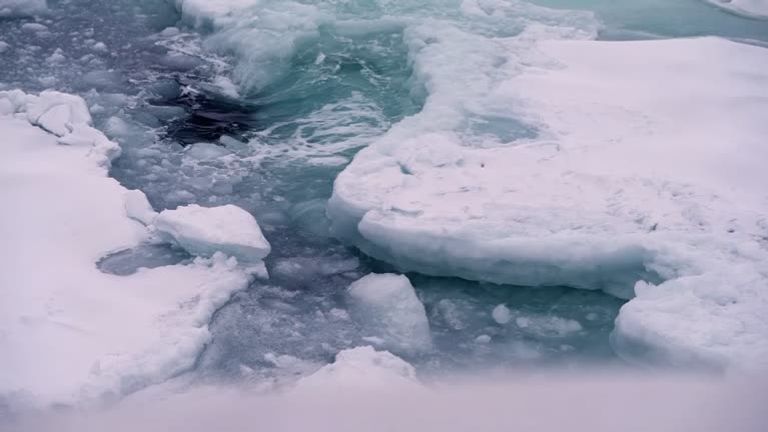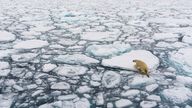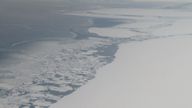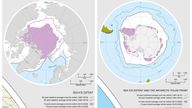Arctic ice melts to second lowest summer level on record
This year is only the second on record when the ice caps have measured below 2.48m square miles (four million square kilometres).
Monday 21 September 2020 22:55, UK
Arctic sea ice has melted to its second lowest level on record as a result of heat waves and forest fires, scientists have said.
On 15 September, ice in the Arctic Ocean measured 1.44 million square miles (3.74 million square kilometres), the US National Snow and Ice Data Centre (NSIDC) said.
This is the second lowest summer melt since satellite records began in 1979.
The only time it has ever been lower before the ice refreezes for the autumn was in 2012, according to NSIDC monitoring.
This year's ice conditions come after a "crazy" stint of heat waves in neighbouring Siberia, which resulted in mass forest fires across the region.
Mark Serreze, NSIDC director, said: "It's been a crazy year up north, with sea ice at a near-record low, 100F (37.7C) heat waves in Siberia, and massive forest fires.
"The year 2020 will stand as an exclamation point on the downward trend in Arctic sea ice extent.
"We are headed towards a seasonally ice-free Arctic Ocean, and this year is another nail in the coffin."
Ed Blockey, the Met Office's scientific manager for polar climate, highlighted the significance of Arctic ice dropping below four million square kilometres.
"The Arctic is one of the most vulnerable regions on Earth to climate change and warming here will have consequences both for the region and the planet as a whole," he said.
Rod Downie, chief polar adviser at WWF, added that the Arctic was in "meltdown" and stressed the grave consequences this could have for the UK.
He said: "What happens in the Arctic doesn't stay in the Arctic.
"The UK is the Arctic's closest neighbour and these extreme events affect us all, from changes in weather to increasing sea levels."
"Iconic" species such as walrus and polar bears are also being put at risk, he added.
In light of the "sobering" data, environmentalists are calling on the UK government to up their climate commitments at the COP26 global conference in Glasgow next year.
Speaking from the edge of the sea ice, on board the Greenpeace Ship Arctic Sunrise, Greenpeace campaigner Laura Meller urged officials to pledge to protect "at least 30% of our oceans by 2030".





